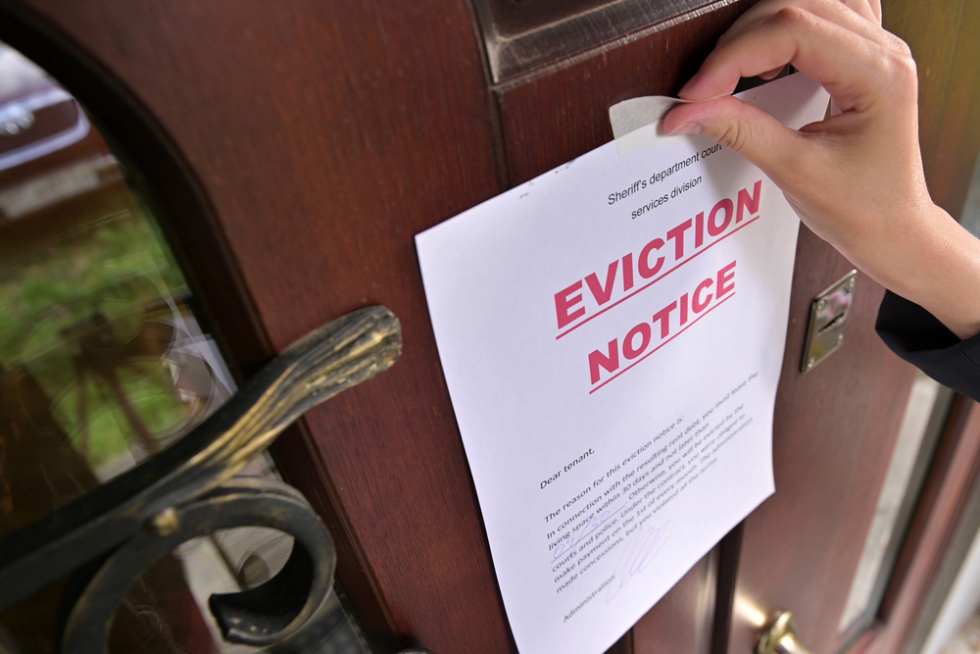How to Write An Eviction Letter (Free Template)

Are you in a challenging situation and need to know how to write an eviction notice? Evictions are never easy—for landlords or tenants. But when a lease is violated or it’s time to end a rental agreement; having a legally sound eviction letter is a critical first step to remove a tenant. Whether you’re dealing with unpaid rent or simply ending a month-to-month lease, a clear and properly written eviction letter template protects your rights and sets the groundwork for a smooth legal process. Here’s how to get started and what to do know about sending your eviction letter.
- What is an Eviction Notice?
- State-by-State Eviction Notice Requirements
- How to Document Tenant Violations
- When to Serve an Eviction Notice With Cause
- When to Serve An Eviction Notice Without Cause
- What to Include in an Eviction Notice
- Eviction Notice Template (For Cause)
- Eviction Notice Template (Without Cause)
- How to Serve an Eviction Notice
- Common Mistakes Landlords Make During Evictions
- When You Should Consult a Lawyer About an Eviction
- Alternatives to Eviction
- How Much is an Eviction Notice?
- Post-Eviction Steps for Landlords
- Do You Need to Write an Eviction Letter?
What is an Eviction Notice?
An eviction notice, or an eviction letter, is the first step in the legal eviction process. When you serve an eviction notice, you’re communicating to your tenant that they need to vacate the property by a given date.
This document also acts as a record of the fact that you gave your tenant sufficient notice of their pending eviction. In the event of your tenant refusing to comply, you may have to take legal action. So, keep a copy of your notice once it’s drafted.
Every state has its own unique set of procedures when it comes to serving termination or eviction notices to tenants. Traditionally, landlords send eviction letters via certified mail. However, this is not required across the board.
You may have a specific reason or cause to evict a tenant. Typically, these reasons fall under two categories: a financial or material violation. Specifically:
- Failure to pay rent
- Violation of the lease
- Property damage
- Reports of illegal activity conducted on the premises
An eviction notice without cause is served in cases when the tenant hasn’t violated the lease or done anything to warrant an eviction. For example, when a tenant’s month-to-month lease has ended. These notices typically must be served up to 60 days in advance.
State-by-State Eviction Notice Requirements
Eviction notice requirements will vary widely depending on the state of your rental, so it's important to know your local laws before proceeding. For example, California generally requires a 3-day notice for unpaid rent, while Florida allows a 7-day notice for lease violations. Some states also differentiate between notices for cause and those without cause, with longer lead times required for no-fault evictions. Always check your state's landlord-tenant laws or consult a local attorney to avoid costly missteps.
How to Document Tenant Violations
In most cases, your tenant has some kind of violations that has lead to the eviction notice. But don’t assume you can just tell the judge what happened. You need proper documentation can make or break your eviction case. Landlords should keep detailed records of any lease violations, including
- Dated photos
- Communication logs (emails or texts)
- Incident reports
- Copies of notices previously sent
- A ledger showing payment history and outstanding balances for unpaid rent (if applicable)
- These records provide solid evidence if the eviction ends up in court and can speed up the resolution in your favor.
When to Serve an Eviction Notice With Cause
An eviction notice with cause can be served after the landlord has evidence that the tenant has violated the lease agreement in some way. The eviction notice is usually served after they’ve decided to move forward with a formal eviction.
However, in many cases, landlords will provide tenants with a warning notice outlining the lease violations or late rent payments. For example, they may give tenants a Late Rent Notice or “Notice to Quit” or “Notice of Lease Violation” prior to the formal eviction notice.
These notices, known as “curable notices,” give tenants the opportunity to remedy their infractions. They can do that by making rent payments or ceasing their violations to avoid eviction.
However, most states allow an eviction notice to be served without allowing for tenant remediation. This is called an “incurable notice.” An incurable notice may be served in the following circumstances:
- Tenant’s violation of a significant lease or rental agreement clause
- Late rent payment on multiple occasions
- Severe property damage caused by the tenant
- Tenant engaged in serious illegal activity on the premises (drug dealing, violating zoning agreements, etc.)
When to Serve An Eviction Notice Without Cause
What is a no cause eviction? An eviction notice without cause means that the landlord is asking the tenant to vacate the property without any specific cause or fault of the tenant. Therefore, many states have set a 30-day or 60-day notice requirement.
Landlords in states with rent-controlled property laws will typically need to provide tenants with a legally justifiable reason for wanting to end the lease agreement. If you do not have a fixed-term agreement with your tenant, you may ask your tenant to move out at any time.
Generally, a 30-day or 60-day notice to terminate a tenancy is required in most states when the landlord does not have a reason to end the tenancy.
The exact timeline for required notices varies by state. It’s anywhere from 3 to 60 days.
For example, the state of Colorado requires a 21-day notice. However, the state of Connecticut requires just 3 days. There may also be notice periods for non-payment of rent compared to other lease violations.
What to Include in an Eviction Notice
As a landlord or property manager, it’s essential for you to draw up an airtight eviction notice. That means that you should know how to write an eviction letter to tenant with all of the following information. You must also follow any state or local statutes pertaining to the issue.
Here’s what your eviction notice should include:
- Addresses
- Date
- Tenant names
- Status and date of the lease
- Why the eviction notice is served (clear and concise explanation)
- Date tenant must vacate the property
- Proof of service or delivery of notice
If you need some additional help writing an eviction notice, use our template below.
Eviction Notice Template (For Cause)
[Community Name] \ [Street Address] \ [City, State, Zip] \ [Phone number and email address]
[Date]
[Tenant Name(s)] \ [Tenant Street Address] \ [Tenant Apartment Number] \ [City, State, Zip]
Dear [Tenant First Name(s)][Tenant Last Name(s)],
A formal written warning was previously issued regarding [state reason for issuing eviction notice]. Your [lease date] rental agreement clearly states in [state section of lease containing the violated policy and exactly what was violated].
Due to the failure on your part to uphold the rental agreement and [reverse and/or remedy] such infraction, the [Apartment Community Name] has no choice but to submit this notice of eviction as of [date served].
You have been given a total of [amount of time] to [state actions to be taken to avoid eviction]. You have [X days, at least the minimum required by law] to surrender possession of the premises located at [Property Address] to [Your (Landlord/Property Manager) Name], or to the landlord’s authorized agent or attorney.
Failure to comply will result in legal action, up to and including physical removal of all tenants from the apartment and the property.
If you have any questions regarding this issue, please contact the rental office and ask for [Your (Landlord/Property Manager) Name].
Sincerely, \ [Your (Landlord/Property Manager) Name]
Eviction Notice Template (Without Cause)
[Community Name] \ [Street Address] \ [City, State, Zip] \ [Phone number and email address]
[Date]
[Tenant Name(s)] \ [Tenant Street Address] \ [Tenant Apartment Number] \ [City, State, Zip]
Dear [Tenant First Name(s)][Tenant Last Name(s)],
NOTICE IS HEREBY GIVEN that within [X days, at least the minimum required by law] after service of this notice on [date served], you must surrender possession of the premises located at [Property Address] to [Your (Landlord/Property Manager) Name], or to the landlord’s authorized agent or attorney.
Your failure to vacate the premises within [X required days] will result in legal actions against you to recover possession of the premises, and to seek a judgment for damages for each day of occupancy after the expiration date of this notice, including but not limited to: treble damages, recoverable attorneys’ fees, and costs associated with any unlawful detention of the premises.
This notice is intended as a [X required days] notice terminating your month-to-month tenancy. Prorated rent in the amount of [X Dollars] ($___ ) is due as of [date] and payable through and including the date of termination of your tenancy under this notice.
Sincerely, \ [Your (Landlord/Property Manager) Name]
How to Serve an Eviction Notice
How to serve an eviction notice correctly is just as important as writing one. Many states require notices to be delivered in specific ways, including certified mail with return receipt, hand-delivery to the tenant, or posting it on the front door. Some jurisdictions also require a copy to be mailed as a backup. Never rely on a verbal agreement to vacate or something you heard from another landlord. You must follow the exact method outlined in your local statutes and retain proof of delivery, like a signed acknowledgment or postal receipt, to protect yourself in court.
Common Mistakes Landlords Make During Evictions
One of the biggest pitfalls in the eviction process is skipping steps or relying on shortcuts. Common mistakes include
- Issuing vague or incomplete notices
- Failing to give the tenant enough time to respond
- Attempting a “DIY eviction” by shutting off utilities or changing the locks
All of these actions can result in legal penalties, including having to pay damages to the tenant. Always follow the legal process to the letter, even if you're dealing with a frustrating situation.
When You Should Consult a Lawyer About an Eviction
Some evictions are straightforward and proceed without any issues. Not every eviction requires an attorney,* but certain scenarios call for professional legal help. If the tenant contests the eviction, claiming retaliation or discrimination, or if you’re unsure about local procedures, it's smart to consult a lawyer. Legal counsel makes sure your notices are valid, assists with court filings, and represents you during hearings. Having expert advice from the beginning can prevent delays and costly mistakes down the line.
Alternatives to Eviction
Sometimes, eviction isn't the only or even the best solution. If possible, consider alternatives like offering a payment plan for overdue rent, negotiating a mutual move-out agreement, or using a “cash for keys” arrangement where you pay the tenant to leave voluntarily. Mediation services can also help resolve disputes without going to court. These options can save time, lower your legal fees and stress, and make it easier to get your unit back under your control.
How Much is an Eviction Notice?
The cost to issue an eviction notice will depend on how you deliver it and other factors, like whether or not you need to hire an attorney or sheriff to help. If you’re serving the notice yourself, it may cost just $10 to print it and send it by certified mail. However, evictions can get expensive quickly and often cost landlords more than they ever imagine. Typical expenses include
- Court filing fees
- Attorney costs
- Lost rent, property damage
- Cleaning or turnover costs
- Possibility of hiring a sheriff to enforce the eviction
- Storage costs for abandoned belongings
Don’t let the costs of an eviction spiral out of control. Planning ahead and budgeting for these expenses can help reduce the financial strain during the eviction process.
Post-Eviction Steps for Landlords
After you use a eviction letter template to prompt a tenant to vacate the property—whether voluntarily or through a court order—there are still important steps to follow. Start by inspecting the unit for damage, taking photos, and documenting its condition. You’ll need to address any repairs, change the locks, and prepare the property for new tenants. Be sure to handle any abandoned personal property according to state law, and return any security deposit balances owed. A smooth transition helps avoid further issues and keep your rental business running efficiently.

Do You Need to Write an Eviction Letter?
Eviction can be a complicated and lengthy process. As a result, it’s always important to ensure that you’re playing by the rules (the law). Prepare for any pushback you may receive and be ready by knowing how to write an eviction letter.
That said, an eviction notice is an essential step in the eviction process. Not providing one can land you in a heap of legal trouble. Remember, an eviction notice alone can’t force a tenant to move out.
That’s why it’s always a good idea to consult a lawyer before moving forward with the formal legal eviction process. They are well-versed in local eviction laws. They can advise you on how to move forward while following correct procedure, including notice delivery. They’ll help you avoid mistakes like taking measures into your own hands (say, changing the locks on a tenant or turning off utilities).
The most important thing to remember when it comes to evictions is the law. As long as you’ve remained on the right side of the law and have complied with local regulations, your rights as a landlord are protected.
Almost every landlord has to deal with an eviction once in their career. Preparing in advance can help to ensure that yours doesn’t cause you a lot of headaches, lost time, and money.
Share this Article





